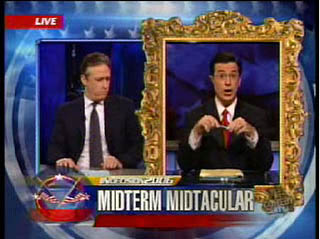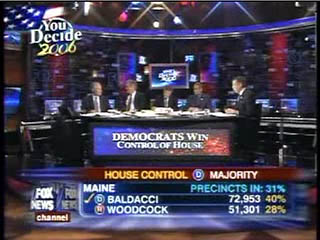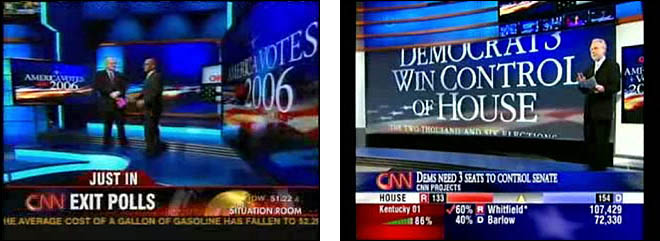
On election night last week, we were channel surfing and comparing the coverage by the various networks. We ended up for a spell at Comedy Central, where Jon Stewart and Steven Colbert exchanged snappy banter with each other in a kind of parody of network news coverage.
Surprisingly, there was a part of me that found it a little tiresome, and I thought to myself “Why don’t these guys just talk like normal people and tell us about the election results, instead of all this rehearsed repartee?”. They were acting out scripted set-peices and skits, or riffing on the results by digging into a selection of pre-planned gags and jokes.

Of course, this is Comedy Central, so the scripted quality of the “reportage” is to be expected. Still, despite our deep appreciation for CC’s two “anchors”, we grew impatient and craved the hard news coverage that only a real network can offer. So we resumed by surfing on over to Oppositeland: Fox News.
I immediately noticed that the narrative and theatrical quality and structure of Fox’s coverage was really no different from Comedy Central’s. Each pundit was talking to the other pundits as if the other person didn’t already know what they were going to say, and yet it was clear that everyone knew exactly what everyone else was going to say. Their conversations were fake in every way — not quite scripted, exactly, but so incredibly contrived as to be basically a kind of vaudeville act.
Switching over to CNN, it was more of the same. Whenever two pundits would talk to each other, each one would play a kind of character in an imaginary conversation. As if to extend the artifice, the sets were outrageously elaborate, and the reporters would interact with the sets in the same contrived way, acting as if it was perfectly normal to learn about the latest election returns from a 40-foot wide TV screen.

What’s the real-life model for these conversations? Two workers talking by the water cooler? A family talking over the dinner table? A college professor talking to a student? Kirk and Spock on the bridge of the Enterprise?
I don’t think it’s really any of these. If anything, it’s far older than that — it’s a Platonic dialogue, with a strong dose of classical Greek or Kabuki theater, where the actors don’t play realistic people at all, but rather they play roles representing ideas in a kind of abstracted, formalized drama: the Anchor (the protagonist with whom we are supposed to identify) plays the Curious King, while the Washinton Bureau Cheif plays the Wise Counselor. The actors use a formalized conversational style to educate us, the audience, about whatever is happening in the news. Here’s a thought from Wikipedia’s entry on Plato that I think applies to TV news as well:
The ostensible mise en scène of a dialogue distances both Plato and a given reader from the philosophy being discussed; one can choose between at least two options of perception: either to participate in the dialogues, in the ideas being discussed, or choose to see the content as expressive of the personalities contained within the work.
Now I’m not in the least surprised to realize that TV news is a form of entertainment. That’s old news, so to speak. What I thought was most interesting was realizing that Comedy Central’s coverage was no different from the hard news shows in this respect, that it’s all just a kind of vaudeville. It’s something I intend to keep a look out for in the future. When watching TV news, ask yourself: Are the pundits or journalists saying things that everyone else on the set already knew they were going to say? Or are the speakers genuinely surprised by what their colleagues are saying? Are you watching two human beings talking to each other, or two performers putting on a collaborative act?
Comments
7 responses to “TV News is Vaudeville”
Since comedy central is doing a parody of the news, i do not find it surprising at all that Comedy Central’s coverage mimics the news. That is part of what can make it so downright hilarious, is the seriousness of the ridiculousness of the presentation. The theater of the news, politics, etc, is what makes the Daily Show and the Colbert Report so damned funny.
Were you stoned when you were watching this stuff?
Stewart and Colbert seem to me to take the issue of Theatre posing as news very seriously. Take Stewart’s appearance on Crossfire as an example: http://www.youtube.com/watch?v=b0vYQDFAiy0
Stewart seems to be genuinely appalled that the institutions that should be informing the public are doing exactly the opposite in their desperate fight for ratings. We’ve seen Colbert confront the media in the same way at the White House Press Correspondents dinner. He was able to point out to them in very stark terms how appallingly they treat objective reality, how they’re able to talk around reality while the world around them goes up in flames.
well, isn’t that the beauty of the CC shows? disdainfully mocking the talking head, pundits and… o’reilly (he’s in a class of his own; part morton downey jr., part asshole)
btw, i thought the CC election coverage was great. i watched the cnn coverage post-12am and kept wishing for jon and steven to pop in with their analysis.
“The Daily Show is as substantive as the “real” news”
http://arstechnica.com/news.ars/post/20061004-7908.html
“…the sets were outrageously elaborate…”
NBC just started podcasting entire episodes of their Nightly News segment, and I unsubscribed after getting 10 minutes into the very first episode. For that very reason above. I actually thought I was watching Comedy Central — I had forgotten how *good* the parody was myself.
At this point if it’s on television, it’s entertainment, and nothing more. All of the “connecting with individuals” has moved to internet.
P.S.: Maybe if we started showing real debates (of any kind) again, this country could remember how to do it without having devalue the other side.
Noah, if you read Lorne’s link above, you’ll see that your dissatisfaction with the Nightly News is well-placed: the shows lack substance, period.